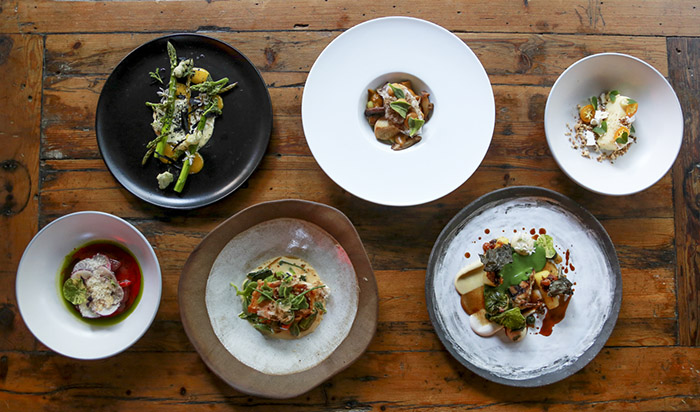If you live in Cape Town, the word forage is familiar to you. We are lucky enough to have the seas, the mountains and the forests to extract some of the best wild produce the country has to offer, with permission of course.
It is every chef’s dream to go bos, in the bos, and create a menu that showcases the best of the Cape’s unrefined ingredients.
Foraging is the oldest form of sustenance, add to that Myoga’s Chef de Cuisine Germaine Esau and you’re in for a unforgettable foraged feast.

Myoga, at Vineyard Hotel in Newlands, is hosting a monthly 6-course dinner that pays homage to to ‘Wild Food from Land and Sea’. Each dining experience is paired with different local wines and is backed by an exciting tale.
During his introduction, Esau stressed the importance of respect for the fresh produce foraged and how zero waste has taught him how to reimagine his menus. The proof is in the pudding.
The first course is seared tuna, preserved plum Eugenia berries, shiso, radish and macadamia. I have never tasted a Eugenia berry before, it is really taut, flavourful and high in vitamin C. The use of the macadamia was clever to add a nutty taste and texture to the dish.

Asparagus, both wild and cultivated with a duck egg and sea celery was the next course. The ingredients were kept true to their purest form, delicious and fresh – which is exactly how foraged food should be served.
My favourite was the following course of Abalobi fish (seafood sustainably caught through the Abalobi App), with dune succulents, mussels and sea urchin cream. If you didn’t know, dune succulent leaves are mildly peppery and can also be added to fresh salads to step up the flavour. The sauce was creamy and sea-salty, and created the perfect spoonful when scooped up with the mussels and fish.

The next three courses were wild mushrooms, dune spinach, wild garlic emulsion and caramelised pumpkin. Followed by the quality, preserved grape leaf, pine-smoked white carrot, local pine nut cream, pine oil and nettle velouté. The quail was a little too gamey for my palate.
I was fascinated to see how the chef would interpret dessert, aside from fresh fruit, there is little to forage to create a unique sweet treat. The baobab parfait, rose pelargonium, lemon verbena, buchu, urban foraged citrus and toasted fennel seed would prove me wrong. It was not overly sweet but it was inventive, textured and tasty.

Each course was paired with a local wine to bring out the subtle hidden notes of the ingredients.
It was an evening of discovery and engineering in the most interesting way possible. Only a true artist can redesign foraged ingredients and Esau has clearly mastered it.
There is one more dinner left in this series and you going to love the name, “from Hook to Cook (Op sy Moer and Abalobi)“. I could tell you more but that would spoil his surprises. I suggest you check it out for yourself and immerse yourself in an enthralling story of the food, the land, and the sea coming together as one.
Contact: 021 657 4500
Address: 60 Colinton Rd, Newlands, Cape Town
Website: www.myoga.co.za

